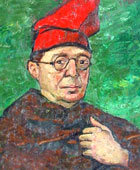William Rose Benét was born on February 2, 1886, in Brooklyn, New York, but was raised in the Pennsylvania city of Bethlehem. He was educated at Yale University and graduated in 1907. His siblings, Stephen Vincent and Laura, were also writers.
William was very diverse in his literary talents. He founded the Saturday Review of Literature with Henry Seidel Canby, Amy Loveman, and others in 1921. Benét edited entries and wrote in columns for the paper for many years. The Saturday Review was a leading publication on literature until the magazine ceased operations in 1982.
Benét created his own encyclopedia in 1948. The Reader’s Encyclopedia is a collection of information that Benét believed would be most important for writers and readers of all ages. In its introduction, he explains, “Likewise it will prove a read aid to the vocabulary and allusiveness of writers, as well as providing them with a genuine source book of ideas.” Benét organized his encyclopedia in a manner in which most English-speaking people can most easily understand. For example, authors and titles appear under the names for which they are most known, and translations are provided for foreign language text. Four editions of The Reader’s Encyclopedia have been published. Bruce Murphy, editor of the most recent edition, preserved the style and format Benét originally used.
William Rose Benét had critiques and columns in several reviews. He is also the creator of numerous collections of poetry, a novel, a volume of essays, and an anthology. Benét completed various editing projects, including the poetry of his second wife, Elinor Wylie. His autobiographical verse-narrative, The Dust Which is God, won a Pulitzer Prize in 1942.
William Rose Benét died on May 4, 1950 in New York City. His passion for literature and writing was reflected in his lifetime devotion to it and in the contributions he made.
This biography was prepared by Ashlee Mayo. |






